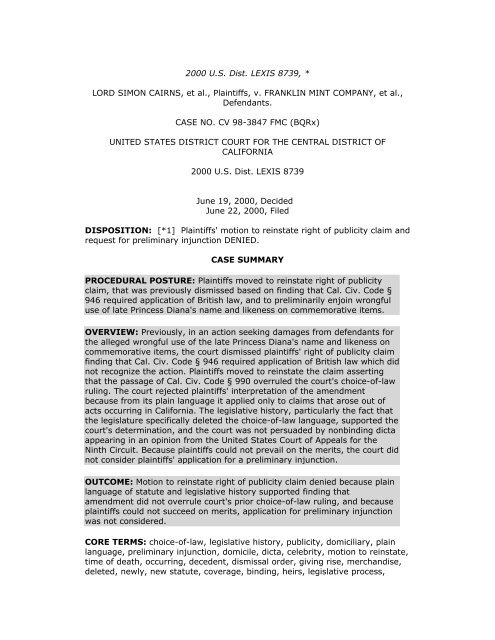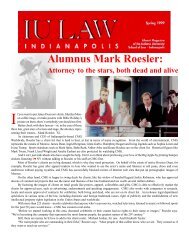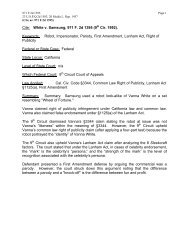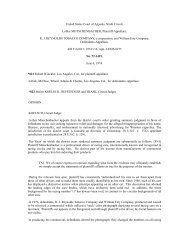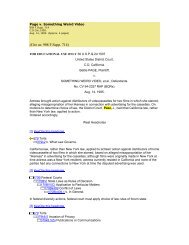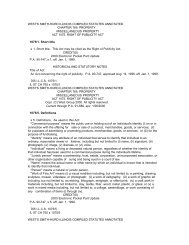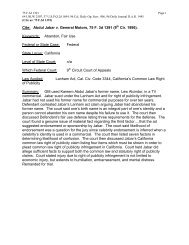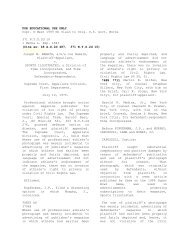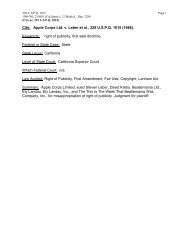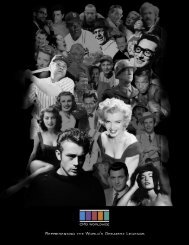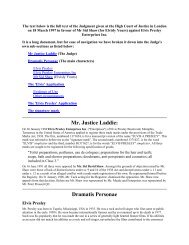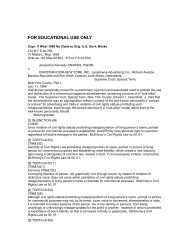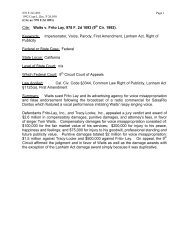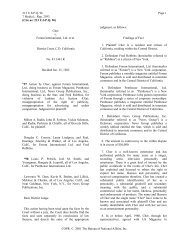Cairns v. Franklin Mint Company - Mark Roesler
Cairns v. Franklin Mint Company - Mark Roesler
Cairns v. Franklin Mint Company - Mark Roesler
Create successful ePaper yourself
Turn your PDF publications into a flip-book with our unique Google optimized e-Paper software.
2000 U.S. Dist. LEXIS 8739, *LORD SIMON CAIRNS, et al., Plaintiffs, v. FRANKLIN MINT COMPANY, et al.,Defendants.CASE NO. CV 98-3847 FMC (BQRx)UNITED STATES DISTRICT COURT FOR THE CENTRAL DISTRICT OFCALIFORNIA2000 U.S. Dist. LEXIS 8739June 19, 2000, DecidedJune 22, 2000, FiledDISPOSITION: [*1] Plaintiffs' motion to reinstate right of publicity claim andrequest for preliminary injunction DENIED.CASE SUMMARYPROCEDURAL POSTURE: Plaintiffs moved to reinstate right of publicityclaim, that was previously dismissed based on finding that Cal. Civ. Code §946 required application of British law, and to preliminarily enjoin wrongfuluse of late Princess Diana's name and likeness on commemorative items.OVERVIEW: Previously, in an action seeking damages from defendants forthe alleged wrongful use of the late Princess Diana's name and likeness oncommemorative items, the court dismissed plaintiffs' right of publicity claimfinding that Cal. Civ. Code § 946 required application of British law which didnot recognize the action. Plaintiffs moved to reinstate the claim assertingthat the passage of Cal. Civ. Code § 990 overruled the court's choice-of-lawruling. The court rejected plaintiffs' interpretation of the amendmentbecause from its plain language it applied only to claims that arose out ofacts occurring in California. The legislative history, particularly the fact thatthe legislature specifically deleted the choice-of-law language, supported thecourt's determination, and the court was not persuaded by nonbinding dictaappearing in an opinion from the United States Court of Appeals for theNinth Circuit. Because plaintiffs could not prevail on the merits, the court didnot consider plaintiffs' application for a preliminary injunction.OUTCOME: Motion to reinstate right of publicity claim denied because plainlanguage of statute and legislative history supported finding thatamendment did not overrule court's prior choice-of-law ruling, and becauseplaintiffs could not succeed on merits, application for preliminary injunctionwas not considered.CORE TERMS: choice-of-law, legislative history, publicity, domiciliary, plainlanguage, preliminary injunction, domicile, dicta, celebrity, motion to reinstate,time of death, occurring, decedent, dismissal order, giving rise, merchandise,deleted, newly, new statute, coverage, binding, heirs, legislative process,
proposed statute, motion to amend, effective date, declarations, addressing,motivation, effectiveCORE CONCEPTS -Hide ConceptsTorts : DamagesGovernments & Legislation : Legislation : Effect & OperationSee Cal. Civ. Code § 3344.1(n).Civil Procedure : Pleading & Practice : Pleadings : Amended PleadingsAlthough leave to amend should be freely granted, where the proposedamendment would be futile a motion to amend may be denied.Governments & Legislation : Legislation : Construction & InterpretationIn determining the meaning of a statutory provision, the court must firstlook to the plain language of the statute.Governments & Legislation : Legislation : Construction & InterpretationEven if a court determines that the plain meaning of the statute is clear, itmay still inquire as to whether the literal meaning of a statute comportswith its purpose. If the court determines that a literal reading will result inan absurd result, then intent will prevail over the letter, and the letter will,if possible, be read so to conform to the spirit of the act.Governments & Legislation : Legislation : Construction & InterpretationIn order to ascertain the intent of the legislature, the court may look atthe history of the statute, committee reports, and staff bill reports.Governments & Legislation : Legislation : Construction & InterpretationCalifornia courts give substantial weight to the deletion of a provisionduring the drafting stage. The fact that the Legislature specificallyconsidered and rejected a provision is most persuasive to the conclusionthat the act should not be construed to include the omitted provision.Civil Procedure : Preclusion & Effect of Judgments : Law of the Case DoctrineThe law of the case doctrine is a judicial invention designed to aid in theefficient operation of court affairs. Under the doctrine, a court is generallyprecluded from reconsidering an issue previously decided by the samecourt, or a higher court in the identical case. For the doctrine to apply theissue in question must have been decided explicitly or by necessaryimplication in the previous disposition. A significant corollary to thedoctrine is that dicta have no preclusive effect.COUNSEL: For DIANA, PRINCESS OF WALES MEMORIAL FUND, a charitabletrust, HONORABLE FRANCES RUTH SHAND KYDD, LADY ELIZABETH SARAHLAVINIA MCCORQUODALE, RIGHT REVEREND AND RIGHT HONORABLERICHARD JOHN CAREW CHARTRES, BISHOP OF LONDON, Executors of theEstate of Diana, Princess of Wales, SIMON CAIRNS, Lord, JOHN EVERSLEY,MICHAEL GIBBINS, LVO, F.C.A., JP, ANTHONY JULIUS, SARAH
MCCORQUODALE, Lady, JILL PITKEATHLEY OBE, Baroness, JOHNREIZENSTEIN, CHRISTOPHER SPENCE MBE, NALINI VARMA, trustees of theDiana, Princess of Wales Memorial Fund, A Charitable trust, plaintiffs: ShariMulrooney Wollman, <strong>Mark</strong> S Lee, Seth A Gold, Alison Spear Ullendorff, ManattPhelps & Phillips, Los Angeles, CA. Cara R. Burns, Gradstein Luskin & VanDalsem, Los Angeles, CA.For DIANA PRINCESS WALES MEMORIAL FUND (NO 1) LIMITED, plaintiff: ShariMulrooney Wollman, <strong>Mark</strong> S Lee, Seth A Gold, Manatt Phelps & Phillips, LosAngeles, CA. Cara R. Burns, Gradstein Luskin & Van Dalsem, Los Angeles, CA.For FRANKLIN MINT COMPANY, a Delaware Partnership, ROLL INTERNATIONALCORPORATION, INC, a Delaware corporation, STEWART RESNICK, anindividual, LYNDA RESNICK, an individual, defendants: Robert A Meyer,Douglas E Mirell, Daniel J Friedman, Lisa Lyn Horlick, Loeb & Loeb, LosAngeles, CA. Robert N Treiman, Loeb & Loeb, Los Angeles, CA.JUDGES: Richard A. Paez, United States Circuit Judge By Designation.OPINIONBY: Richard A. PaezOPINION: ORDER DENYING PLAINTIFFS' MOTION TO REINSTATERIGHT OF PUBLICITY CLAIM AND MOTION FOR A PRELIMINARYINJUNCTIONI.IntroductionThis action was originally assigned to Judge Richard A. Paez. Recently,however, with the appointment of Judge Paez to the Ninth Circuit Court ofAppeals, this case was randomly reassigned to Judge Florence Marie Cooper.While this case was pending before Judge Paez, the plaintiffs filed a Motion toReinstate Right to Publicity Claim and for Preliminary Injunction. Judge Paezheard that motion on March 20, 2000, and at the conclusion of the hearingsubmitted the matter for decision. On May 2, 2000, Judge Paez entered anorder summarily denying plaintiffs' motion but indicated that he would file amore detailed memorandum explaining the basis for his ruling. Thus, JudgePaez now sets forth the reasons why plaintiffs' motion to reinstate and forpreliminary injunction were properly denied.At the outset, the Court notes that when it dismissed plaintiffs' [*2] right ofpublicity claim and denied the request for a preliminary injunction on October16, 1999, it did so with a detailed summary of plaintiffs' factual allegations andlegal claims. <strong>Cairns</strong> v. <strong>Franklin</strong> <strong>Mint</strong> Co., 24 F. Supp. 2d 1013 (C.D. Cal. 1998).No useful purpose would be served to repeat that summary here. We simplynote, to place plaintiffs' present motion in context, that plaintiffs seek damagesfor defendants alleged wrongful use of the late Princess Diana's name andlikeness on commemorative items such as plates, jewelry and dolls, and inmarketing such items to the general public.One of the claims plaintiffs alleged, and the one dismissed by the court, wasthat defendants' use of the late Princess Diana's likeness violated the
postmortem right of publicity recognized by California Civil Code § 990 (nowcodified at Civil Code § 3344.1). In dismissing this claim, the Court held thatbecause then Civil Code § 990 did not contain a choice-of-law provision, CivilCode § 946 required application of British law. As British law does notrecognize a right of publicity cause of action, the claim was dismissed withprejudice. The Court also denied plaintiffs' [*3] motion for a preliminaryinjunction finding that plaintiffs were not likely to prevail on the merits of anyof their remaining claims.Plaintiffs, having obtained leave from the Ninth Circuit to pursue aninterlocutory appeal of the dismissal order, sought appellate review of bothorders. On December 30, 1999 the Ninth Circuit affirmed both orders in anunpublished memorandum opinion.In seeking to reinstate the right of publicity claim, plaintiffs assert that in1999, the California Legislature amended and recodified Civil Code § 990 tooverrule the Court's holding in the dismissal order that Civil Code § 946required application of British law to plaintiffs' right of publicity claim. Theyargue that a newly added choice-of-law provision now requires application ofCalifornia, not British law. According to plaintiffs, subsection (n) of newlyenacted § 3344.1 is a choice-of-law provision. Subsection (n) provides:This section shall apply to the adjudication of liability and theimposition of any damages or other remedies in cases in whichthe liability, damages, and other remedies arise from actsoccurring directly in this state. For purposes of this section, actsgiving [*4] rise to liability shall be limited to the use, on or inproducts, merchandise, goods, or services, or in advertising orselling, or soliciting purchases of, products, merchandise, goods,or services prohibited by this section. California Civil Code. §3344.1(n).For the reasons set forth below, the Court rejects plaintiffs' interpretation ofthis newly adopted statutory provision. To adopt plaintiffs' interpretation wouldrequire the Court to rewrite the statute; a task which is best left to theCalifornia Legislature.II.DISCUSSIONA. StandardAlthough plaintiffs style their motion as a motion to reinstate their dismissedclaims it is more appropriately treated as a motion to file an amendedcomplaint to add a claim for damages for defendants' alleged wrongful conductsince the effective date of the new statute. January 1, 2000. With the NinthCircuit's affirmance of the dismissal order, all of plaintiffs' right of publicityclaims that accrued prior to the effective date of the new statute are barred aslaw of the case. If subsection (n) of the new statute is a choice-of-lawprovision, then plaintiffs would be entitled to amend their complaint to addsuch a claim [*5] for damages accruing from January 1, 2000. Because
subsection (n) of section 3344.1 is not a choice-of-law provision, plaintiffs maynot assert such a claim under this newly adopted statute. Although leave toamend should be freely granted, where the proposed amendment would befutile a motion to amend may be denied. Saul v. United States, 928 F.2d 829,843 (9th Cir. 1991). Thus, even treating plaintiffs' motion to reinstate as amotion to amend the complaint, the motion to reinstate and the relatedrequest for a preliminary injunction are DENIED.B. California Civil Code Section 3344.1 and its Legislative History1. The Nature of Legislative HistoryIn his concurrence in Conroy v. Aniskoff, 507 U.S. 511, 518-528, 123 L. Ed. 2d229, 113 S. Ct. 1562 (1993), Justice Scalia writes of the inherent difficulties ofundue reliance on legislative history. Justice Scalia invokes a metaphor used byJudge Harold Leventhal who describes "legislative history as the equivalent ofentering a crowded cocktail party and looking over the heads of the guests forone's friends." Id. at 519. The flaw in legislative history, according to JusticeScalia, is that it can be twisted [*6] and manipulated by participants andobservers alike. Both plaintiffs and defendants in this case lobbied vigorouslybefore the Legislature in support of their respective positions. Hence, theirattorneys participated actively in the legislative proceedings leading up to theadoption of § 3344.1(n). Both plaintiffs and defendants have provided theCourt with excerpts of the legislative history that support their respectivepositions. After carefully reviewing the entire legislative history, the Courtconcludes that the plain language of subsection (n) is determinative; it is notand cannot be reasonably interpreted as a choice-of-law provision. There is nodoubt, that the initial drafts of the proposed statute contained a choice-of-lawprovision that, if enacted, would have overturned this Court's decision in<strong>Cairns</strong>. Rarely, however, does the initial language of a proposed bill remainintact throughout the legislative process. The nature of the legislative processinevitably results in compromise. It is clear from a review of the legislativehistory here, that the choice-of-law provision in an early version of theproposed statute tell victim to just such a compromise and was [*7] neverenacted.2. Plain LanguageIn determining the meaning of a statutory provision, the Court must first lookto the plain language of the statute. Astaire v. Best Film & Video Corp., 116F.3d 1297, 1300 (9th Cir. 1997), amended, 136 F.3d 1208 (9th Cir. 1390),cert. denied, 119 S. Ct. 161 (1998) citing Dyna-Med, Inc. v. Fair Employment& Housing Comm'n, 43 Cal. 3d 1379, 241 Cal. Rptr. 67, 743 P.2d 1323 (1987).The California Supreme Court held in Dyna-Med that courts must "give to thelanguage its usual, ordinary import and accord[] significance, if possible, toevery word, phrase and sentence in pursuance of the legislative purpose...."Id. at 1386-87.The provision in question, subdivision 3344.1(n) states that:This section shall apply to the adjudication of liability and theimposition of any damages or other remedies in cases in which
the liability, damages, and other remedies arise from actsoccurring directly in this state. For purposes of this section, actsgiving rise to liability shall be limited to the use, on or inproducts, merchandise, goods, or services, or in advertising orselling, or soliciting [*8] purchases of, products, merchandise,goods, or services prohibited by this section. California CivilCode. § 3344.1(n).The only reasonable interpretation of this provision from its plain language isthat it applies only to claims that arise out of acts occurring in California. Theprovision simply addresses the reach of the statute's coverage. Plaintiffs arguethat the language means that any action, regardless of the domicile of thedecedent, may be brought in California, as long as it involves some actionableconduct that occurred in California. This interpretation rewrites the Statute. n1Plaintiffs' interpretation of the provision goes beyond the plain language as itrequires the Court to read in language regarding domicile that is not presentEven if the plain language could be interpreted in this manner, such a readingdoes not comport with the legislative history.- - - - - - - - - - - - - - - - - -Footnotes- - - - - - - - - - - - - - - - - -n1 In its dismissal order, the Court noted how the Legislature could haveincluded a choice-of-law provision in former § 990. The Court noted "had itintended to create such an exception, the Legislature could easily haveincluded a choice-of-law provision indicating that California law dictateswhether the right of publicity is a property right included in a decedent'sestate." <strong>Cairns</strong>, 24 F. Supp. 2d at 1027. If the Legislature disagreed with thisCourt's application of Section 946 to Section 990, it could easily have rectifiedthe situation by stating that Section 946 was not applicable.- - - - - - - - - - - - - - - - -End Footnotes- - - - - - - - - - - - - - - - - [*9]3. Legislative HistoryThe Court finds that the language of the statute is clear and that there is noneed to inquire further. Nonetheless, the California supreme Court has heldthat even if a court determines that the plain meaning of the statute is clear,it may still inquire as to whether the "literal meaning of a statute comportswith its purpose." Lungren v. Deukmejian, 45 Cal. 3d 727, 729, 248 Cal. Rptr.115, 755 P.2d 299 (1988). If the Court determines that a literal reading willresult in an absurd result, then "intent [will] prevail[] over the letter, and theletter will, if possible, be read so to conform to the spirit of the act." Astaire,116 F.3d at 1301.In order to ascertain the intent of the Legislature, the Court may look at "thehistory of the statute, committee reports, and staff bill reports." Id. citingDeCastro West Chodorow & Burns, Inc. v. Superior Court, 47 Cal. App. 4th410, 411 (1996). The parties have supplied the Court with al). relevantinformation including, drafts of the legislation, staff reports, and transcripts ofvarious legislative hearings.a. Direct Legislative History
On January 20, 1999, Senator John Burton [*10] introduced Senate Bill 209which initially contained a choice-of-law provision at subsection (o). Subsection(o) stated "[a] plaintiff has standing to bring an action pursuant to this sectionif any of the acts giving rise to the action occurred in this state, whether or notthe plaintiff is a domiciliary of this state." (Pl's Reply, Exh. B at 8.) Asubsequent draft altered the provision somewhat to state "whether or not thedecedent was a domiciliary of this state at the time of death." Id.At a June 22, 1999 Judiciary Committee hearing, Assembly Member Pachecoasked Senator Burton, the bill's original sponsor, if he was willing to accept twoamendments to the bill. One of these amendments deleted the language insubsection (o), i.e. that the statute was applicable whether or not the decedentwas a domiciliary of this state at the time of death. The amendment insertednew language, found at subsection (n) which simply states that the sectionapplies to acts occurring in California. In response to Assembly MemberPacheco, Senator Burton attempted to reinsert the following language"whether or not the decedent was a domiciliary of this state at the time of thedeath" back into [*11] the statute, after the words "directly in this state."(Pl's Reply, Exh. B., Mirrell Decl. P 11 at 35.)Pacheco asked Burton why this amendment was necessary, and Burtonrequested that <strong>Mark</strong> Lee, plaintiffs' attorney, speak to the issue. Lee explainedthat the provision was necessary to clarify existing law in the wake of thisCourt's decision in <strong>Cairns</strong>.Thereafter, Assembly Member Kuehl explained that this language had beendeleted in order to maintain neutrality on the choice-of-law issue. Specifically,Kuehl said "we somewhat (sic) with notable lack of courage, I think, decidednot to jump into that question because, at the moment, the law does not eitherrequire one to be a domiciliary -- at least in the statutory law -- does notrequire this or not require this. I didn't want to go that far." In response,Burton withdrew his amendment, indicating that he might later try andreintroduce the provision. n2 As such, the June 29, 1999 version of the bill thatreflects the June 22, 1999 changes does not contain any reference to domicile.Id. at 35-36. The law was enacted as amended.- - - - - - - - - - - - - - - - - -Footnotes- - - - - - - - - - - - - - - - - -n2 Plaintiffs are correct that overturning <strong>Cairns</strong> was one of the originalmotivations, albeit a secondary one, of the bill's sponsor. The newly passedstatute, which is entitled the "Astaire Celebrity Image Protection Act" wasenacted principally to eliminate exemptions for certain types of media that theNinth Circuit found in Section 990 in Astaire v. Best Film & Video Corp., 116F.3d 1297 (9th Cir. 1997), amended, 136 F.3d 1208 (9th Cir. 1998), cert.denied, 119 S. Ct. 161 (1998).<strong>Cairns</strong>, was Senator Burton's second motivation. In the final analysis he wasforced to except a compromise and the language specifically stating that non-California domiciliaries are covered was deleted.- - - - - - - - - - - - - - - - -End Footnotes- - - - - - - - - - - - - - - - - [*12]The fact that the language specifically addressing the choice-of-law issue was
deleted is relevant in how the Court construes the statute. In Jimeno v. MobilOil Co., 66 F.3d 1514, 1530 (9th Cir. 1995), the Ninth Circuit held that "California courts give substantial weight to the deletion of a provision duringthe drafting stage." The fact that the Legislature specifically considered andrejected a provision 'is most persuasive to the conclusion that the act shouldnot be construed to include the omitted provision." Id.Plaintiffs rely on the California Assembly Committee on Judiciary's Analysis ofSenate Bill No. 209, as Amended March 3, 1999, that suggests the amendmentthat became subsection (n) was, like the previous subsection (o), an attemptto overturn <strong>Cairns</strong>. The Analysis argues that the language that becamesubsection (n) "preserve[s] the author's intent in not limiting the bill'sapplicability to heirs of celebrities who were domiciliaries of California at thetime of death. (Pl's Reply, Exh. B. at 109). This analysis was prepared in March1999, while the amendment and Committee debate surrounding it occurred onJune 22, 1999. The Court gives [*13] little weight to legislative historypredating the amendment to the statute.The colloquy surrounding the amendment makes it clear that the domicilelanguage was intentionally stricken from the bill so that the Legislature wouldremain neutral on the very issue decided by this Court in <strong>Cairns</strong>.Most important is that the critical language affording non-Californians the rightto sue under California law was stricken from the bill prior to its enactment bythe Legislature. Plaintiffs give no reason why this language was not included inthe final version of the bill. Senator Burton's attempt to resubmit the domicilelanguage into the provision that eventually became subsection (n) is furtherevidence that the final language of subsection (n) did not address the domicileissue. Lastly, the fact that Assembly Member Kuehl specifically stated an intentto remain neutral on this issue, coupled with Burton's reservation of the rightto reintroduce the domicile language at a later date, confirms that the plainlanguage of subsection (n) is in conformity with the Legislature's intent inpassing the bill.b. Underlying Legislative HistoryAs noted above, there are inherent difficulties [*14] in trying to sort throughthe various sources of legislative history. Both parties have supplied the Courtwith a multitude of sources from which they argue the Court can discern thelegislature's true intent. Unfortunately, with the exception of the letter byProfessor Erwin Chemerinsky, the vast majority of the evidence submitted isirrelevant to determining the issue at hand.i. Chemerinsky, et al. LetterThe concerns of the legislators over the domicile issue were most likelyprompted, in part, by a letter written to Assembly Member Kuehl fromProfessors Chemerinsky (USC), Dougherty (Loyola), Barnett (Boalt), Volokh(Loyola), Manheim (Loyola), Madow (Brooklyn), Samuelson (Boalt), Williams(Loyola), Lemley (Texas), Sobel (Entertainment Law Reporter). (Pl's Reply,Exh. B., at 85-89.) The primary concern of the professors with proposedsubsection (o) was its territorial reach, not the choice-of-law provision. Theprofessors were concerned that the original language granting such a far
eaching right of action - "if any of the acts giving rise to the action occurred inthis state..." - was unconstitutional under BMW of North America, Inc. v. Gore,517 U.S. 559, 572-73, 134 L. Ed. 2d 809, 116 S. Ct. 1589 (1996). [*15] Thislanguage was modified in the final version of the bill to provide that liabilitycan only "arise from acts occurring directly in this state." Cal. Civ. Code §3344.1(n).Secondarily, and of interest to the Court, the professors stated that theprovision ran afoul of the public policy underlying Civil Code § 990, the originalprovision that Senate Bill 209 would amend. Id. at 87, The intent behindformer Civil Code § 990, was to protect California residents, as the state hasno legitimate interest in protecting deceased non-California celebrities. Thepurpose was to encourage celebrities to live in California and not move tostates with greater protection. The problem with the amendment, according tothe professors, is that California would be encouraging celebrities to liveoutside of the state. The professors "questioned the wisdom of opening upCalifornia's judicial system to the estates of every personality in the world." Id.87-88.Lastly, the professors cautioned the Legislature to proceed cautiously in light ofthe ongoing litigation in this case. The professors noted that subsection (o)was apparently intended to overturn this Court's decision in <strong>Cairns</strong>. [*16] Theprofessors cautioned the Legislature to await the outcome of the Ninth Circuitappeal. "Taking action to undo the results of a trial court decision that awaitsappellate action is precipitous indeed." Id. at 88.While the above cited letter is not part of the bill's actual legislative history, inconjunction with comments made by the legislators and the ensuing changesmade to the legislation that reflect the changes sought by the professors, itappears that the letter influenced the final language in the bill. As such, itfurther supports the Court's conclusion that subsection 3344.1(n) is not achoice-of-law provision.ii. Improper Evidence of Legislative IntentIn an attempt to clarify the legislative history, both parties submitteddeclarations of committee counsel who offer differing views of the legislationand articles commenting on the passage of the bill that favor their respectivepositions. While the comments of the two legislative aides may be illuminating,the Court may not rely on their declarations. California law prohibits Courtsfrom "consider[ing] the motives or understandings of an individual legislatoreven if he or she authored the statute. [*17] " Astaire, 116 F-3d at 1302citing Wil1iams v. Garcetti, 5 Cal. 4th 561, 853 P.2d 507 (1993). If the Court isnot permitted to consider statements of the bill's authors as evidence of intent,the Court clearly cannot consider the statements of their aides.C. Ninth Circuit OpinionThe Ninth Circuit affirmed the Court's dismissal of the right of publicity claimon December 30, 1999. In dicta the Court initially wrote thatthe California Legislature amended Section 990, effective
January 1, 2000, to expressly include a choice-of-law provisionthat expands coverage of the statute to heirs of celebrities whowere not domiciliaries of California at the time of death. SeeSenate Bill 209, 1999 Legis. Sess. (Cal. 1999).This Court then issued a minute order postponing the resolution of plaintiffs'motion to reinstate, pending the Ninth Circuit's ruling on the defendants'petition for rehearing. The Court specifically stated thatthe Ninth Circuit characterized a recent amendment, effectiveJanuary 1, 2000, to California's right to publicity statute,California Civil Code Section 3344.1, as a 'choice-of-lawprovision.' The Court may have [*18] to consider whether thenew amendment is a choice-of-law provision in order to rule onthe pending motion. Upon a review of the parties' papers, thetext of the amended statute, and its legislative history, itappears to the Court that this new provision may not be achoice-of-law provision.In response, the Ninth Circuit panel issued an order amending its previousruling to delete the words "choice-of-law" but otherwise denying the petitionfor rehearing.By deleting the phrase "choice-of-law" from its opinion, the Ninth Circuit hassignaled its agreement with the Court's initial and current analysis that theamendment -- subsection (n) -- is not a choice-of-law provision. Thememorandum opinion, however, still contains language that the provision"expands coverage of the statute to heirs of celebrities who were notdomiciliaries of California at the time of death."To the extent that the Ninth Circuit panel's comments can be perceived asindicating that the provision is a choice-of-law provision, they are not bindingon this Court because (1) the comments are of and concerning the Senate Billand not the precise statutory language adopted by the Legislature and (2) the[*19] comments are dicta.In Milgard Tempering, Inc. v. Selas Corp. of Am., 902 F.2d 703, 715 (9th Cir.1990), the Ninth Circuit stated:The law of the case doctrine is a judicial invention designed toaid in the efficient operation of court affairs. Under the doctrine,a court is generally precluded from reconsidering an issuepreviously decided by the same court, or a higher court in theidentical came. For the doctrine to apply the issue in questionmust have been "decided explicitly or by necessary implication in[the) previous disposition." A significant corollary to the doctrineis that dicta have no preclusive effect. (citations omitted).
As the Ninth Circuit panel cites not to subsection (n) of 3344.1, but rathergenerally to Senate Bill No. 209, the Court finds that the Ninth Circuit has norspoken directly, in dicta or otherwise, on the issue raised by plaintiffs' motion.As noted above, the legislation that eventually became Section 3344.1 wentthrough several drafts. It did, in fact, contain a choice-of-law provision inseveral of the drafts. Even if the language of the Ninth Circuit's memorandumdisposition was binding on the Court, as more than [*20] dicta, the NinthCircuit has not spoken specifically on subsection (n). Under thesecircumstances, the Court is at liberty to interpret the new provision consistentwith its plain language and the relevant legislative history as warranted.Even if the Ninth Circuit's opinion can be construed as addressing subsection(n), the statement would still not be binding upon this Court as it is dicta. Thecomment on the Senate Bill was not necessary to the Circuit's decision andtherefore is nothing more than dicta. Milgard Tempering, Inc., 902 F.2d at 716.The Ninth Circuit's decision was limited to upholding this Court analysis of CivilCode §§ 990 and 964.D. Preliminary InjunctionThere is no need for the Court to address this issue as the Court hasdetermined that plaintiffs cannot in fact prevail on the merits of their right ofpublicity claim. As a "moving party must show, at an irreducible minimum, thatthere is a fair chance of success on the merits," the related application for apreliminary injunction is DENIED. <strong>Cairns</strong>, 24 F. Supp. 2d at 1043 citingStanley v. University of Southern California, 13 F.3d 1313, 1319 (9th Cir.1994). [*21]III. ConclusionFor the foregoing reasons, plaintiffs' motion to reinstate the right of publicityclaim and request for a preliminary injunction as previously ordered areDENIED.IT IS SO ORDERED.DATED: June 19, 2000Richard A. PaezUnited States Circuit JudgeBy Designation


